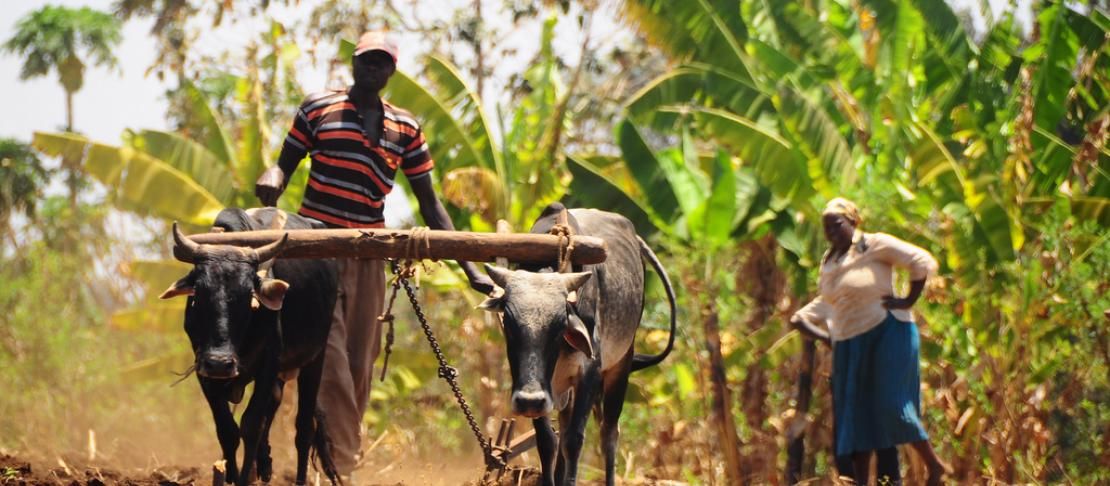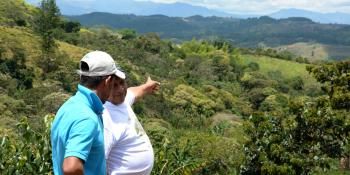Reaching the private sector with tools and resources for climate-smart agriculture in East Africa

CCAFS has strived to address the knowledge needs for implementing and scaling up climate-smart agriculture by coming up with a range of resources and tools for different stakeholders. Listen to a webinar that introduces such resources to the private sector.
The CGIAR Research Program on Climate Change, Agriculture and Food Security (CCAFS) recently hosted a webinar to introduce private sector actors in East Africa to the multitude of tools and resources available for implementation of climate-smart agriculture (CSA).
The event attracted over 200 climate change and food security practitioners from the East African region and beyond, who signed up to listen to the key speakers; 80 attended the online event.
Listen to a recorded version of the webinar on YouTube below:
Read on for a report back from the webinar:
“In all practicality, private sector operates on evidence-based decision making. This ability is based on information, knowledge and experience,” said Suresh Patel, Chair of Sector Board of Environment, and Water & Natural Resources at the Kenya Private Sector Alliance (KEPSA), who gave a presentation during the webinar.
Mr Patel has been a prominent voice of the private sector in Kenya, including the national climate change planning processes.
According to Mr Patel, for managing climate change, the private sector will look to science-based tools to make appropriate decisions – science that is focused on evidence and reliability. In agriculture, these decisions will be geared towards all three emphases of climate-smart agriculture - near-term productivity and food security; longer-term resilience and adaptation; and reductions in emissions across landscapes, agriculture and food systems. KEPSA represents over 100,000 direct and indirect members, and is the umbrella body for the private sector in Kenya.
Responding to the pressing need for science-based tools to transition the agricultural sector, CCAFS offers a range of tools and resources for multiple stakeholder groups, including the private sector in East Arica and beyond. These were highlighted by Sonja Vermeulen, CCAFS Head of Research and James Kinyangi, Program Leader for East Africa:
Access presentation here: What does CCAFS offer private sector partners in East Africa?
The CCAFS Big Facts project houses the most current “Big Facts” about climate change, agriculture and food security. Each fact is authoritatively researched and presented with source materials, photos and illustrations.
Agtrials.org is an information portal which provides access to a database on the performance of agricultural technologies at sites across the developing world. It builds on decades of evaluation trials, mostly of varieties, but includes any agricultural technology for developing world farmers.
The Food Security Case Maps provide analysis of future food security scenarios in developing countries.
CCAFS Climate Portal provides downscaled Global Circulation Model (GCM) data, which enable practitioners to assess climate impacts in agricultural systems.
Climate Analogues, using one or more global climate models, the analogues tool developed by CCAFS takes climate and rainfall predictions for a particular site and searches for places with similar conditions at present. Armed with the knowledge of what they may face in future, farmers, researchers and policy makers can determine their adaptation options based on real – as opposed to crystal ball-gazing – models.
According to Mr. Patel, the private sector in Kenya and beyond has the opportunity to apply these tools and many others in areas such as: remote sensing-based agriculture tools for crops; soil carbon inventories; pasture biomass sensors, pest and disease control, soil and nutrient management, genetic resources management among others.
Access Suresh Patel’s presentation
A number of case studies that show how CCAFS research has been put into use by the private sector, to generate tangible benefits they were also shared with participants. These include Heifer International’s East Africa Dairy Development (EADD) programme, which works to create a robust dairy industry in the region. More than 200,000 farmers will improve dairy production and gain access to markets over the next four years under this programme.
“EADD has now adopted climate-smart agriculture as a programme objective and the International Livestock Research Institute (ILRI) and the World Agroforestry Centre (ICRAF) are programme partners, supporting priority setting and design processes”, noted James Kinyangi.
In Kenya and Ethiopia, ILRI has been instrumental in working with partners such as Cornell University and insurance companies to develop and pilot Index-Based Livestock Insurance (IBLI). IBLI gives pastoralists the option to insure themselves against extreme weather events and resulting livestock mortality. In contrast with conventional insurance products, IBLI tracks local forage conditions using real-time, publicly available satellite data (“greenness maps”) to determine the severity of drought, predict area-average livestock losses, and calculate policyholders’ indemnity payments.
Conclusion
The one hour online discussion ended with a question and answer session where participants sought more information on accessing the various tools and resources.
“CCAFS research outputs and results are available for use in the form of publications including journal articles, working papers, policy briefs, reports, info notes, outcome cases and in many other formats. All resources are global public goods and freely available”, concluded Dhanush Dinesh, CCAFS Global Policy Engagement Manager who was also the webinar facilitator and organiser.
If you found this webinar to be of interest and would like to keep abreast of CCAFS research, subscribe to our e-bulletins here.
This webinar was part of the CCAFS Private Sector Webinar series, upcoming webinars in this series include:
La ciencia detrás de la Agricultura Sostenible Adaptada al Clima, 12 September 2014
Exploring GHG mitigation potential in rice production, 18 September 2014
Vivian Atakos is a Communication Specialist with CCAFS East Africa. For more information about CCAFS work in East Africa visit our webpage and follow @cgiarclimate_EA on twitter.



